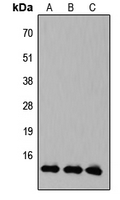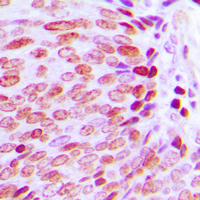

| WB | 咨询技术 | Human,Mouse,Rat |
| IF | 咨询技术 | Human,Mouse,Rat |
| IHC | 1/50-1/100 | Human,Mouse,Rat |
| ICC | 技术咨询 | Human,Mouse,Rat |
| FCM | 咨询技术 | Human,Mouse,Rat |
| Elisa | 咨询技术 | Human,Mouse,Rat |
| Aliases | KLF10; TIEG; TIEG1; Krueppel-like factor 10; EGR-alpha; Transforming growth factor-beta-inducible early growth response protein 1; TGFB-inducible early growth response protein 1; TIEG-1; KLF11; FKLF; TIEG2; Krueppel-like factor 11; Transforming growth factor-beta-inducible early growth response protein 2; TGFB-inducible early growth response protein 2; TIEG-2 |
| Entrez GeneID | 7071; |
| WB Predicted band size | 52kDa |
| Host/Isotype | Rabbit IgG |
| Antibody Type | Primary antibody |
| Storage | Store at 4°C short term. Aliquot and store at -20°C long term. Avoid freeze/thaw cycles. |
| Species Reactivity | Human,Mouse,Rat |
| Immunogen | KLH-conjugated synthetic peptide encompassing a sequence within the C-term region of human KLF10/11. |
| Formulation | Purified antibody in PBS with 0.05% sodium azide. |
+ +
以下是3篇涉及KLF10/11抗体的参考文献及简要摘要:
1. **文献名称**: *"KLF10 inhibits cell growth by regulating P53 in colorectal cancer"*
**作者**: Zhang Y, et al.
**摘要**: 该研究使用KLF10抗体通过Western blot和免疫组化分析结直肠癌组织中KLF10的表达,发现KLF10通过激活p53通路抑制肿瘤细胞增殖,提示其作为抑癌因子的潜在作用。
2. **文献名称**: *"KLF11 mediates TGF-β-induced apoptosis in pancreatic cancer cells"*
**作者**: Fernández-Zapico ME, et al.
**摘要**: 通过免疫沉淀和染色质免疫共沉淀(ChIP)结合KLF11抗体,研究发现KLF11在TGF-β信号通路中促进胰腺癌细胞凋亡,其表达缺失与化疗耐药相关。
3. **文献名称**: *"KLF10 regulates hepatic lipid metabolism through PPARγ"*
**作者**: Li H, et al.
**摘要**: 利用KLF10基因敲除小鼠及KLF10抗体进行组织染色,发现KLF10通过调控PPARγ表达影响肝脏脂质代谢,缺失会导致脂肪肝和胰岛素抵抗。
4. **文献名称**: *"KLF11 suppresses breast cancer metastasis by transcriptional repression of EMT markers"*
**作者**: Wang X, et al.
**摘要**: 通过免疫荧光和Western blot结合KLF11抗体,研究证实KLF11通过抑制上皮间质转化(EMT)关键分子(如Snail和Twist)减少乳腺癌转移,其低表达与患者预后不良相关。
以上文献均涉及KLF10/11抗体的实验应用(如Western blot、免疫组化、ChIP等),并聚焦于其在癌症、代谢疾病中的功能机制。
KLF10 (Krüppel-like factor 10) and KLF11 (Krüppel-like factor 11) are transcription factors belonging to the Krüppel-like factor family, characterized by conserved C-terminal zinc finger domains that bind DNA to regulate gene expression. These proteins play critical roles in cellular processes, including differentiation, apoptosis, and response to growth signals. KLF10. also known as TIEG1 (TGF-β-inducible early gene 1), is involved in TGF-β signaling pathways and modulates cell cycle progression, fibrosis, and osteoblast differentiation. KLF11. or TIEG2. shares structural homology with KLF10 and participates in insulin gene regulation, neural development, and tumor suppression. Both are implicated in metabolic diseases, cancer, and tissue remodeling.
Antibodies targeting KLF10/11 are essential tools for studying their expression, localization, and function. These antibodies are typically developed using immunogenic peptide regions, such as the N-terminal or zinc finger domains, and validated through techniques like Western blotting, immunohistochemistry, and chromatin immunoprecipitation (ChIP). Their specificity is crucial due to homology within the KLF family. Researchers use KLF10/11 antibodies to explore roles in diseases like diabetes, fibrosis, and malignancies, where dysregulation of these transcription factors correlates with pathological progression. Commercial antibodies often vary in clonality (monoclonal/polyclonal) and host species, requiring careful optimization for experimental conditions. Reliable antibodies aid in elucidating KLF10/11’s dual roles as tumor suppressors or context-dependent oncogenes, highlighting their therapeutic potential.
×